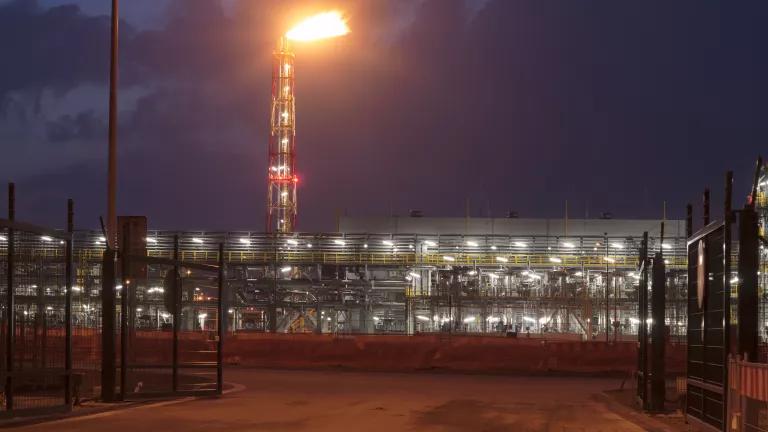The UK Must Stop Subsidizing Its #1 Climate Polluter: Drax
A steady drumbeat of new research showing that Drax, the world’s largest biomass-burning power station, is exacerbating climate change and putting at risk the UK’s chances of meeting climate targets.

As the UK prepares to host the climate COP in Glasgow, it continues to subsidize its biggest CO2 polluter: Drax. This is despite a drumbeat of new research showing that Drax, the world’s largest biomass-burning power station, is exacerbating climate change and putting at risk the UK’s chances of meeting climate targets. Evidence from around the world also spotlights how Drax’s massive demand for wood fuel harms vital forest ecosystems in Europe and North America and threatens the health of marginalized communities in the U.S. South.
This month, climate think tank Ember revealed that, when accurately accounting for all emissions, Drax is the UK’s largest single source of CO2 emissions. It also found that beginning in 2019, carbon emissions from burning biomass in the UK electricity sector exceeded those from coal and were second only to emissions from burning fossil gas. In other words, an energy source many governments have deemed “renewable” is a top polluter.
Just a week later, a new report by Chatham House and Woodwell Climate Research Center found that emissions from burning U.S. wood pellets in power stations in the EU28 (the 27 member states of the European Union + the UK) increased from 9–11 million tonnes of CO2 in 2014 to 16–19 million tonnes in 2019. Most of this was accounted for by the UK, where emissions increased from 7 –8 million tonnes of CO2 in 2014 to 13–16 million tonnes in 2019. Almost the entire increase in UK emissions was associated with biomass burned at Drax.
Alarmingly, hardly any of these emissions were included in the UK’s national GHG inventory. If they were, Chatham House concluded this would have added 22-27% to the emissions from total UK electricity generation, or 2.8-3.6% of total UK GHG emissions in 2019 – equivalent to the annual emissions of six to seven million passenger vehicles simply missing from the UK’s balance sheet.
The findings reinforced those of a new NRDC report, which calculated that biomass supply chains similar to what Drax predominantly relies on are so highly emissive that they will worsen climate change, even with the addition of carbon capture and storage (CCS) technology at the smokestack. This raises serious questions about Drax’s claim that it will become a ‘carbon negative’ power station, as well as the UK Government’s plan to rely on bioenergy with CCS (so-called BECCS) to meet ‘net zero’ emissions targets, as I discussed here.
If all this wasn’t enough to shut down claims that burning biomass is a climate solution, the S&P Global Dow Jones delisted Drax from its Global Clean Energy Index over concerns about its poor environmental performance. In conjunction with this major news, the financial firm Jefferies told its clients plainly that bioenergy was “unlikely to make a positive contribution” towards tackling the climate crisis.
And Drax is currently the subject of a complaint to the OECD filed by the Forest Litigation Collaborative over the company’s misleading claims that burning wood pellet biomass is beneficial for the climate.
But the case against biomass is not limited to climate pollution.
Unlike solar and wind, large-scale wood-burning in power stations also emits dangerous air pollution that causes an array of health harms. Drax currently faces criminal prosecution over health harms to its workers from wood dust at Drax Power Station. Ember also reports that Drax is one of Europe’s top emitters of dangerous particulate emissions, putting it in the same notorious category as some of the continent’s worst coal plants.
Meanwhile, wood pellet mills supplying the biomass energy industry are exploding across the U.S. South, the region from which Drax purchases most of its wood pellets.
Communities in the region with Drax-owned mills in their backyards tell us that wood pellet production comes with dust, noise 24/7, and other negative impacts, which perpetuate decades of environmental racism. In April, the company was fined $2.5 million over serious air quality breaches at its pellet mill in Gloster, Mississippi, which sits literally in the backyard of the Blackman Hole community.

The home of a local community member, Jasmine. She once thought she developed asthma from a job only to find that it wasn't from the job, but instead where her home was located in Amite, MS
This is the largest known fine ever levied on such a facility, yet it is equal to less than one day’s worth of subsidy Drax receives from the UK Government. That’s right: billions in UK Government subsidies, meant to support the deployment of renewable energy and clean up the UK electricity grid, are not only paying to increase carbon emissions, but also polluting the air of vulnerable communities of color across the ocean.

Aerial view of plant in the Blackmon Hole Mobile home Park
As if all this weren’t bad enough, biomass further imperils the planet’s ecosystems and wildlife. Amidst a biodiversity crisis, with scientists predicting that one million species face extinction, wood entering Drax’s supply chain routinely comes from clearcuts of old and biodiverse forests around the world that are home to a host of species and serve as vital carbon sinks.
On July 5, 2021, Channel 4 News investigators exposed how wood from a clearcut of an old and biodiverse Estonian forest not only ended up burned at Drax Power Station, but was certified as “sustainable.” This summer, the European Commission even brought infringement proceedings against Estonia for logging, in part for biomass, in its Natura 2000 reserves—a Europe-wide network of areas meant to protect the region’s most imperiled species.

An area protected under Estonia law—a “woodland key habitat” (WKH)—in Mäksa, Tartu county, South Estonia. The area was clear cut in part for biomass and some of it was sold to Graanul Invest, a large pellet producer that supplies Drax.
Also this summer, after years of misleading claims about making wood pellets only from the byproducts of logging (i.e., “wastes and residues”), CNN reported that wood pellet manufacturer Enviva took one-quarter of the trees from a clearcut of a one-hundred-year-old wetland forest to turn into wood pellets at its mill in Northampton, North Carolina, which supplies Drax.
And while there is talk in UK Government policy circles about transitioning away from imported biomass towards domestic sources, Drax’s real-world investments are at odds with this narrative. Instead, the company is actively heading in the opposite direction, locking in its biomass import supply chains. Drax recently purchased Pinnacle Renewable Energy in Canada, the second-largest producer of industrial wood pellets in the world, and Drax now owns or has interests in 17 other pellet plants and development projects across North America, which it uses to self-supply pellets. In Canada, Pinnacle’s (now Drax’s) wood pellet mill “haul zones” overlap with critical primary forests and habitat for the threatened woodland caribou.
Nevertheless, the UK Government continues to subsidize Drax to the tune of £2 million per day and Drax is currently lobbying the Government to grant it additional subsidies to add CCS technology to its plant. Ember estimates this project will require £31.7 billion in new subsidies. Such large government subsidies should guarantee large climate benefits. Yet, the evidence summarized here indicates the policy would be ineffective at drawing down emissions and, perversely, make climate change – and a host of other environmental and social impacts – worse.
Together, this casts a long shadow over UK claims of climate leadership and suggests the UK Government’s plan to rely heavily on bioenergy to meet its climate commitments under the Paris Agreement is high risk for people and planet and should be met with significant scepticism.
The clean energy revolution we've long imagined shouldn't mean increased carbon emissions, air pollution, or clearcut forests. The UK Government should end dirty biomass electricity subsidies to Drax and other large biomass-burning power stations and reinvest the savings in wind, solar and other genuine climate solutions.



